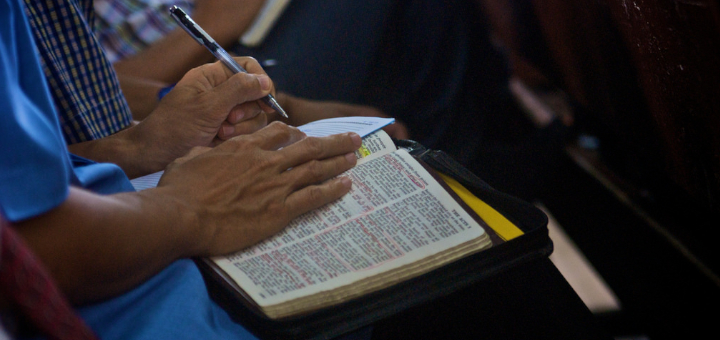Trying storying in a men’s Bible study group

Reuben, in the Philippines, has a discipleship group of three working men: an architect, a tax manager and a computer scientist.
Before trying storytelling, Reuben used more traditional Bible study methods where he selected a passage and then explained and related it to their lives. This process took much preparation time and he found it was difficult to draw out answers from the members of the group.
Then Reuben went on a short-term missionary team and learned about storytelling from a missionary. He decided to try it with his discipleship group.
He told the Creation story first and then two weeks later the story found in Genesis 3 of people’s rebellion against God. The first thing he noticed was that group members now found it easy to discuss the Bible passage. He also noticed changes in his own experience: “I become more focused on God’s conversations in the story and see much more value on what He says in His Word. It caused us to noticed things in the story that we hadn’t thought about before. Interesting questions also arose in the discussion and it made us be more in awe with God and His Word. For instance, on the last story we had, Rebellion Story, we used to know that Adam and Eve just ate the fruit but did not really notice the things going on their hearts conveyed during Eve’s conversation with the serpent and how the Word of God also described the things happening in Eve. The story said that Eve saw that the fruit was good for food, pleasing to the eye and desirable for gaining wisdom. This method made us interact with the Word more and encourages us to go back to it and see the story ourselves.”
When asked their favorite part of the story, one stated it was when God was looking for Adam and Eve. For another, it was when God put them out of the garden because of their rebellion. Some questions that arose were the reason why God created the tree of knowledge of good and evil, why did we inherit Adam and Eve’s sin, and what if Adam resisted when Eve told him to eat the fruit? One said he identified himself through the attitude of Adam and Even before, during and even after they sin. There is a sense of rebellion, of wanting to be like God and then enjoying sin and feeling ashamed afterwards. One valued God’s relentless pursuit of man even though we sinned. He was moved by the fact that God asks where they are even though He knew they rebelled against Him. One valued his role as a man, the importance of taking responsibility and not just being passive. Adam should have told Eve that they must not eat the fruit or he should have resisted when Eve told him to eat.
The group has continued to hear and engage with Bible stories every two weeks.
Thanks to FN who submitted this story.



























